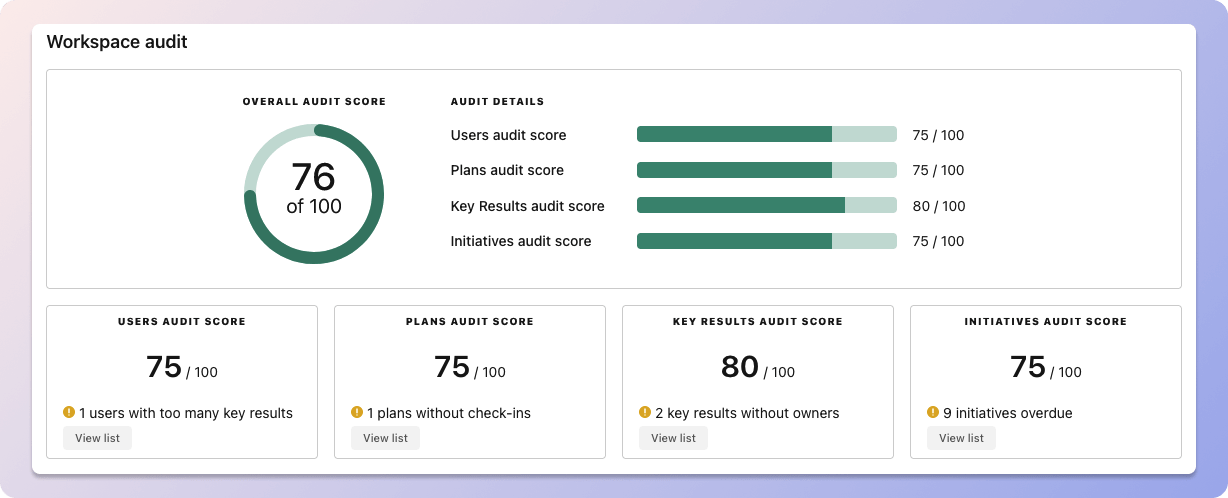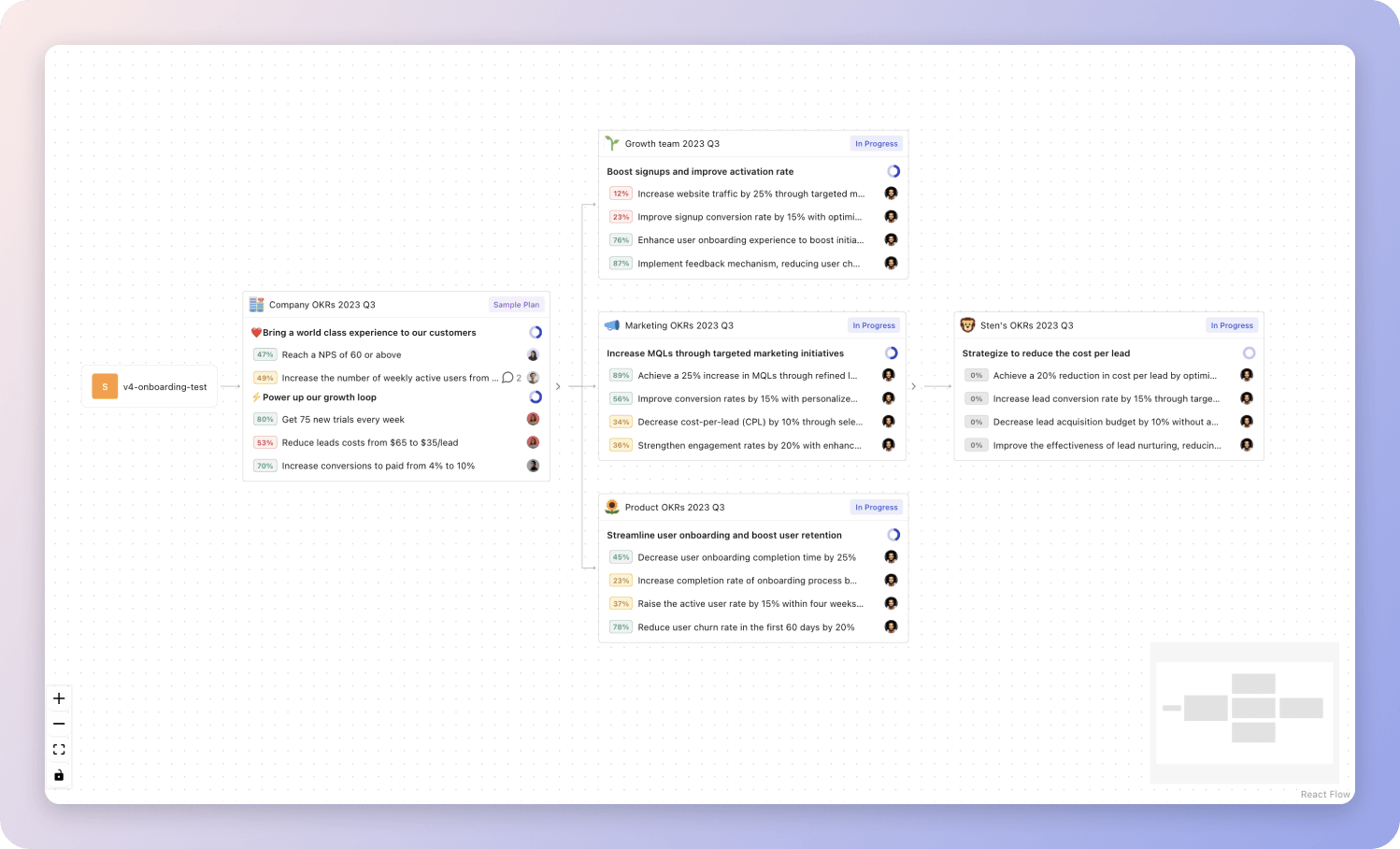7 OKR examples for Systems Manager
What are Systems Manager OKRs?
The Objective and Key Results (OKR) framework is a simple goal-setting methodology that was introduced at Intel by Andy Grove in the 70s. It became popular after John Doerr introduced it to Google in the 90s, and it's now used by teams of all sizes to set and track ambitious goals at scale.
How you write your OKRs can make a huge difference on the impact that your team will have at the end of the quarter. But, it's not always easy to write a quarterly plan that focuses on outcomes instead of projects.
That's why we have created a list of OKRs examples for Systems Manager to help. You can use any of the templates below as a starting point to write your own goals.
If you want to learn more about the framework, you can read more about the OKR meaning online.
Best practices for managing your Systems Manager OKRs
Generally speaking, your objectives should be ambitious yet achievable, and your key results should be measurable and time-bound (using the SMART framework can be helpful). It is also recommended to list strategic initiatives under your key results, as it'll help you avoid the common mistake of listing projects in your KRs.
Here are a couple of best practices extracted from our OKR implementation guide 👇
Tip #1: Limit the number of key results
The #1 role of OKRs is to help you and your team focus on what really matters. Business-as-usual activities will still be happening, but you do not need to track your entire roadmap in the OKRs.
We recommend having 3-4 objectives, and 3-4 key results per objective. A platform like Tability can run audits on your data to help you identify the plans that have too many goals.
 Tability's audit dashboard will highlight opportunities to improve OKRs
Tability's audit dashboard will highlight opportunities to improve OKRsTip #2: Commit to the weekly check-ins
Don't fall into the set-and-forget trap. It is important to adopt a weekly check-in process to get the full value of your OKRs and make your strategy agile – otherwise this is nothing more than a reporting exercise.
Being able to see trends for your key results will also keep yourself honest.
 Tability's check-ins will save you hours and increase transparency
Tability's check-ins will save you hours and increase transparencyTip #3: No more than 2 yellow statuses in a row
Yes, this is another tip for goal-tracking instead of goal-setting (but you'll get plenty of OKR examples below). But, once you have your goals defined, it will be your ability to keep the right sense of urgency that will make the difference.
As a rule of thumb, it's best to avoid having more than 2 yellow/at risk statuses in a row.
Make a call on the 3rd update. You should be either back on track, or off track. This sounds harsh but it's the best way to signal risks early enough to fix things.
Building your own Systems Manager OKRs with AI
While we have some examples below, it's likely that you'll have specific scenarios that aren't covered here. There are 2 options available to you.
- Use our free OKRs generator
- Use Tability, a complete platform to set and track OKRs and initiatives
- including a GPT-4 powered goal generator
Best way to track your Systems Manager OKRs
Quarterly OKRs should have weekly updates to get all the benefits from the framework. Reviewing progress periodically has several advantages:
- It brings the goals back to the top of the mind
- It will highlight poorly set OKRs
- It will surface execution risks
- It improves transparency and accountability
Spreadsheets are enough to get started. Then, once you need to scale you can use a proper OKR platform to make things easier.
 Tability's Strategy Map makes it easy to see all your org's OKRs
Tability's Strategy Map makes it easy to see all your org's OKRsIf you're not yet set on a tool, you can check out the 5 best OKR tracking templates guide to find the best way to monitor progress during the quarter.
Systems Manager OKRs templates
We've covered most of the things that you need to know about setting good OKRs and tracking them effectively. It's now time to give you a series of templates that you can use for inspiration!
We've added many examples of Systems Manager Objectives and Key Results, but we did not stop there. Understanding the difference between OKRs and projects is important, so we also added examples of strategic initiatives that relate to the OKRs.
Hope you'll find this helpful!
OKRs to reduce the frequency of rollbacks following system releases
Reduce the frequency of rollbacks following system releases
Initiate feedback loop to understand and rectify 100% of rollback reasons each release
Implement regular meetings to review and analyze rollback reasons
Develop and execute improvement strategies to rectify rollback issues
Identify and document all rollback reasons from the latest release
Implement monitoring checks to catch 90% of release issues within first 48 hours
Develop and implement automated system checks
Establish quick and efficient incident response procedures
Define key functionality areas for intense monitoring post release
Decrease rollbacks by 20% through improving pre-release testing protocols
Train team on advanced testing strategies
Increase frequency of software testing cycles
Implement strict pre-release testing protocols
OKRs to successfully migrate to GitLab
Successfully migrate to GitLab
Complete migration plan and timeline, including a step-by-step guide for all teams
Develop a detailed timeline with specific milestones and accountable team members
Create a comprehensive step-by-step guide outlining the migration process for all involved teams
Conduct a thorough analysis and assessment of all existing systems and data
Collaborate with relevant teams to identify potential roadblocks and ensure seamless transition
Migrate 100% of the code repositories and branches from the current system to GitLab
Ensure all team members are trained and proficient in using GitLab for version control
Assign mentors to assist team members in mastering GitLab version control
Regularly assess and evaluate team members' proficiency in GitLab usage
Conduct comprehensive GitLab training for all team members
Provide ongoing support and resources to enhance proficiency in GitLab
Achieve 100% uptime and stability on GitLab platform throughout the migration process
Collaborate with the migration team to establish effective communication channels and address concerns promptly
Conduct thorough testing of the GitLab platform for any potential issues or vulnerabilities
Perform regular backups and monitor system logs to proactively identify and address any disruptions
Implement redundant systems and failover mechanisms to ensure continuous availability
OKRs to build a process orchestration system
Improve process efficiency and effectiveness through an automated orchestration system
Increase process scalability by integrating the system with external tools and data sources
Achieve a 90% reduction in manual errors by implementing automated quality checks and validations
Develop and implement automated quality check systems for error detection and prevention
Identify and analyze existing manual error-prone processes for automation
Continuously refine and update automated validation procedures based on feedback and findings
Conduct regular audits to monitor the effectiveness of automated quality checks
Improve user satisfaction by maintaining an average response time of less than 5 seconds
Reduce process execution time by 20% through system optimization and streamlined workflows
Streamline and automate manual processes to eliminate unnecessary steps and reduce execution time
Analyze system performance bottlenecks to identify areas for optimization and improvement
Collaborate with stakeholders to identify and resolve any workflow inefficiencies or bottlenecks
Prioritize and implement software upgrades or patches to enhance system efficiency and performance
OKRs to increase effectiveness of fraud detection systems
Increase effectiveness of fraud detection systems
Train staff on improved systems to ensure 100% compliance within the quarter
Schedule comprehensive training sessions on improved systems
Organize evaluation to confirm complete compliance
Monitor staff progress and address any issues
Reduce false positives rate by 10%
Implement machine learning algorithms to improve detection accuracy
Regularly review and adjust error thresholds
Refine selection criteria and verification policies
Increase detection algorithm accuracy by at least 15%
Revise existing detection algorithm for improved accuracy
Implement more rigorous algorithm testing methods
Gather comprehensive dataset for better training
OKRs to improve organization's DevOps practices and monitoring systems
Improve organization's DevOps practices and monitoring systems
Implement real-time monitoring for critical systems
Set up necessary hardware and infrastructure for real-time monitoring
Research and select a real-time monitoring software solution
Create a checklist of critical systems to be monitored in real-time
Train staff on using the real-time monitoring system and troubleshooting potential issues
Achieve 99% uptime for all production services
Implement automated monitoring systems to detect and resolve service interruptions promptly
Create redundancy in server infrastructure to prevent single points of failure
Establish a robust backup and disaster recovery plan for all production services
Regularly schedule and perform maintenance tasks to optimize system performance and stability
Reduce mean time to resolution (MTTR) for incidents by 20%
Increase adoption of DevOps practices across all teams
Implement automated CI/CD pipelines for faster software delivery
Encourage cross-functional collaboration and knowledge sharing between teams
Regularly review and optimize existing processes to ensure continuous improvement
Provide comprehensive DevOps training for all teams
OKRs to enhance efficiency and accuracy in month end reporting systems
Enhance efficiency and accuracy in month end reporting systems
Achieve 100% on-time delivery of month-end reports through improving project management routines
Frequently monitor project progress and adjust as needed
Implement training on time management for team members
Review and streamline project scheduling and assignment processes
Cut down time spent on month-end reports by 30% by streamlining the process
Identify and eliminate redundant steps in report process
Incorporate automated data collection and compilation
Prioritize and condense report information
Decrease month-end reporting errors by 60% through automated data validation
Schedule regular system maintenance and audits
Train staff on new validation protocols
Implement automated data validation software
OKRs to decommission all identified systems by 2024
Decommission all identified systems by 2024
Conduct final review to ensure all decommissioned systems are properly shut down
Document final review findings
Confirm cessation of systems via verification protocols
Identify all systems slated for decommission
Successfully decommission 50% of identified systems by end of quarter
Execute decommissioning safely and efficiently
Identify essential vs. non-essential systems for business operations
Develop a detailed decommissioning plan and schedule
Complete inventory of all systems slated for decommission by end of quarter
Finalize and document inventory report
Conduct thorough inventory of these systems
Identify all systems scheduled for decommissioning
More Systems Manager OKR templates
We have more templates to help you draft your team goals and OKRs.
OKRs to ensure all company devices are asset tagged
OKRs to integrate two applications seamlessly
OKRs to improve talent acquisition
OKRs to enhance productivity and operation efficiency in IT management
OKRs to boost sales performance across the company
OKRs to streamline data architecture to enhance overall efficiency and decision-making
OKRs resources
Here are a list of resources to help you adopt the Objectives and Key Results framework.
- To learn: Complete 2024 OKR cheat sheet
- Blog posts: ODT Blog
- Success metrics: KPIs examples